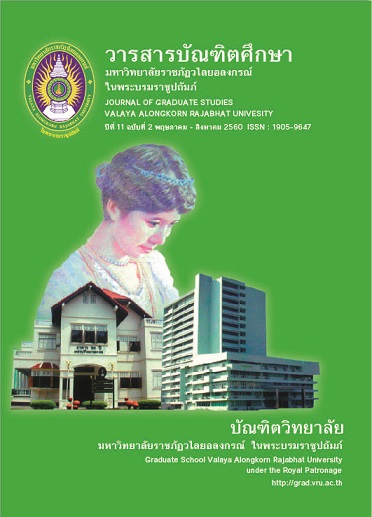การพัฒนารูปแบบการเรียนการสอนสุขศึกษา ตามแนวคิดการเรียนรู้ แบบใช้ปัญหาเป็นฐานผสมผสานกลวิธีเมตาคอกนิชัน สำหรับนักเรียนชั้นมัธยมศึกษาปีที่ 3
Main Article Content
Abstract
บทคัดย่อ
การวิจัยครั้งนี้มีวัตถุประสงค์เพื่อ 1) พัฒนารูปแบบการเรียนการสอนสุขศึกษา ตามแนวคิดการเรียนรู้แบบใช้ปัญหาเป็นฐานผสมผสานกับเมตาคอกนิชัน สำหรับนักเรียนชั้นมัธยมศึกษาปีที่ 3 2) ศึกษาผลของการใช้รูปแบบที่พัฒนาขึ้น กลุ่มตัวอย่าง ได้มาโดยวิธีการสุ่มแบบหลายขั้นตอน ได้แก่ นักเรียนชั้นมัธยมศึกษาปีที่ 3 โรงเรียนบัวขาว อำเภอกุฉินารายณ์ จังหวัดกาฬสินธุ์ จำนวน 81 คน แบ่งเป็นกลุ่มทดลองจำนวน 40 คน กลุ่มควบคุมจำนวน 41 คน เครื่องมือที่ใช้ในการเก็บรวบรวมข้อมูล คือ แบบทดสอบวัดผลสัมฤทธิ์ทางการเรียน ค่าความเชื่อมั่น เท่ากับ 0.98 แบบวัดความสามารถในการแก้ปัญหา ค่าความเชื่อมั่น เท่ากับ 0.97 และแบบวัดความสามารถในเมตาคอกนิชัน ระยะเวลาในการศึกษา ปีการศึกษา 2556 สถิติที่ใช้ในการวิเคราะห์ข้อมูล ได้แก่ ค่าเฉลี่ย ค่าส่วนเบี่ยงเบนมาตรฐาน ค่าที (dependent t-test) และ one way ANOVA ผลการวิจัยพบว่า
1) รูปแบบการเรียนการสอนที่พัฒนาขึ้นมีองค์ประกอบ คือ 1.1) ที่มาและความสำคัญ 1.2) ทฤษฎีและแนวคิดพื้นฐาน 1.3) หลักการ 1.4) จุดมุ่งหมาย 1.5) กระบวนการเรียนรู้ และ 1.6) การวัดและประเมินผล
2) ผลการใช้รูปแบบที่พัฒนาขึ้น พบว่า
2.1) นักเรียนกลุ่มทดลอง มีผลสัมฤทธิ์ทางการเรียน ความสามารถทางในการแก้ปัญหา ความสามารถในเมตาคอกนิชัน หลังเรียนด้วยรูปแบบการเรียนการสอนที่พัฒนาขึ้นสูงกว่านักเรียนกลุ่มควบคุม อย่างมีนัยสำคัญทางสถิติที่ระดับ .01
2.2) นักเรียนกลุ่มทดลองมีผลสัมฤทธิ์ทางการเรียน ความสามารถทางในการแก้ปัญหา ความสามารถทางด้านเมตาคอกนิชัน หลังเรียนด้วยรูปแบบการเรียนการสอนที่พัฒนาขึ้น สูงกว่าก่อนเรียน อย่างมีนัยสำคัญทางสถิติที่ระดับ .01
ABSTRACT
The purpose of the research were 1) to develop a health educationalinstructional model based on problem based learning with metacognitive strategy for Mathayom Suksa 3 students 2) to study the effects of using the instructional model. The subjects were 81 students of Mathayom Suksa 3 from Buakhao School. These subjects were divided into two groups; 40 students were the experimental group and41 were the control group. The research instruments for collecting data, there were; the health learning achievement test with a reliability of 0.98., the health problem solving test with a reliability of 0.96., the meta-cognitional ability test. The study in a term of 2013 academic year. The data was analyzed by using mean, standard deviation, t-test and one way ANOVA. The research finding were:
1) The instructional model developed based on problem based learning with metacognitive strategy for Mathayom Suksa 3 students consisted 1.1) background
1.2) theory and basic concepts 1.3) principle 1.4) objective 1.5) instructional procedure and 1.6) assessment and evaluation.
2) The effects after learning through the developed instructional model were:
2.1) the health educational achievement, the health problem solving abilities and the metacognitive abilities of the experimental group were significantly higher than the group learning through the traditional instruction at the statistical significance level of .01.
2.2) the health educational achievement, the health problem solving abilities and the metacognitive abilities of the experimental group after learning were significantly higher than before being learned at the statistical significance level of .01.
Article Details

This work is licensed under a Creative Commons Attribution-NonCommercial-NoDerivatives 4.0 International License.
บทความทุกเรื่องได้รับการตรวจความถูกต้องทางวิชาการโดยผู้ทรงคุณวุฒิ ทรรศนะและข้อคิดเห็นในบทความ Journal of Global of Perspectives in Humanities and Social Sciences (J-GPHSS) มิใช่เป็นทรรศนะและความคิดของผู้จัดทำจึงมิใช่ความรับผิดชอบของบัณฑิตวิทยาลัย มหาวิทยาลัยราชภัฏวไลยอลงกรณ์ ในพระบรมราชูปถัมภ์ กองบรรณาธิการไม่สงวนสิทธิ์การคัดลอก แต่ให้อ้างอิงแหล่งที่มา


